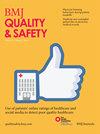‘Whatever you cut, I can fix it’: clinical supervisors’ interview accounts of allowing trainee failure while guarding patient safety
引用次数: 18
Abstract
Background Learning is in delicate balance with safety, as faculty supervisors try to foster trainee development while safeguarding patients. This balance is particularly challenging if trainees are allowed to experience the educational benefits of failure, acknowledged as a critical resource for developing competence and resilience. While other educational domains allow failure in service of learning, however, we do not know whether or not this strategy applies to clinical training. Methods We conducted individual interviews of clinical supervisors, asking them whether they allowed failure for educational purposes in clinical training and eliciting their experiences of this phenomenon. Participants’ accounts were descriptively analysed for recurring themes. Results Twelve women and seven men reported 48 specific examples of allowing trainee failure based on their judgement that educational value outweighed patient risk. Various kinds of failures were allowed: both during operations and technical procedures, in medication dosing, communication events, diagnostic procedures and patient management. Most participants perceived minimal consequences for patients, and many described their rescue strategies to prevent an allowed failure. Allowing failure under supervision was perceived to be important for supporting trainee development. Conclusion Clinical supervisors allow trainees to fail for educational benefit. In doing so, they attempt to balance patient safety and trainee learning. The educational strategy of allowing failure may appear alarming in the zero-error tolerant culture of healthcare with its commitment to patient safety. However, supervisors perceived this strategy to be invaluable. Viewing failure as inevitable, they wanted trainees to experience it in protected situations and to develop effective technical and emotional responses. More empirical research is required to excavate this tacit supervisory practice and support its appropriate use in workplace learning to ensure both learning and safety.“无论你削减了什么,我都能弥补”:临床主管在采访中讲述了在保护患者安全的同时允许实习生失败
背景学习与安全处于微妙的平衡中,因为教员主管试图在保护患者的同时促进受训者的发展。如果让受训者体验失败的教育益处,这种平衡尤其具有挑战性,因为失败被认为是培养能力和韧性的关键资源。然而,尽管其他教育领域允许学习服务失败,但我们不知道这种策略是否适用于临床培训。方法我们对临床督导进行了个别访谈,询问他们在临床培训中是否出于教育目的允许失败,并总结他们对这种现象的经验。对参与者的叙述进行描述性分析,找出重复出现的主题。结果12名女性和7名男性报告了48个允许受训者失败的具体例子,这是基于他们对教育价值大于患者风险的判断。允许出现各种故障:在手术和技术程序中,在给药、沟通事件、诊断程序和患者管理中。大多数参与者认为对患者的影响很小,许多人描述了他们的救援策略,以防止出现允许的失败。允许在监督下失败被认为对支持受训人员的发展很重要。结论临床督导允许受训人员因教育利益而失败。在这样做的过程中,他们试图在患者安全和学员学习之间取得平衡。在致力于患者安全的零错误容忍医疗文化中,允许失败的教育策略可能显得令人担忧。然而,主管们认为这种策略是非常宝贵的。他们认为失败是不可避免的,希望受训者在受保护的情况下体验失败,并制定有效的技术和情感反应。需要更多的实证研究来挖掘这种隐性监督实践,并支持其在工作场所学习中的适当使用,以确保学习和安全。
本文章由计算机程序翻译,如有差异,请以英文原文为准。
求助全文
约1分钟内获得全文
求助全文

 求助内容:
求助内容: 应助结果提醒方式:
应助结果提醒方式:


